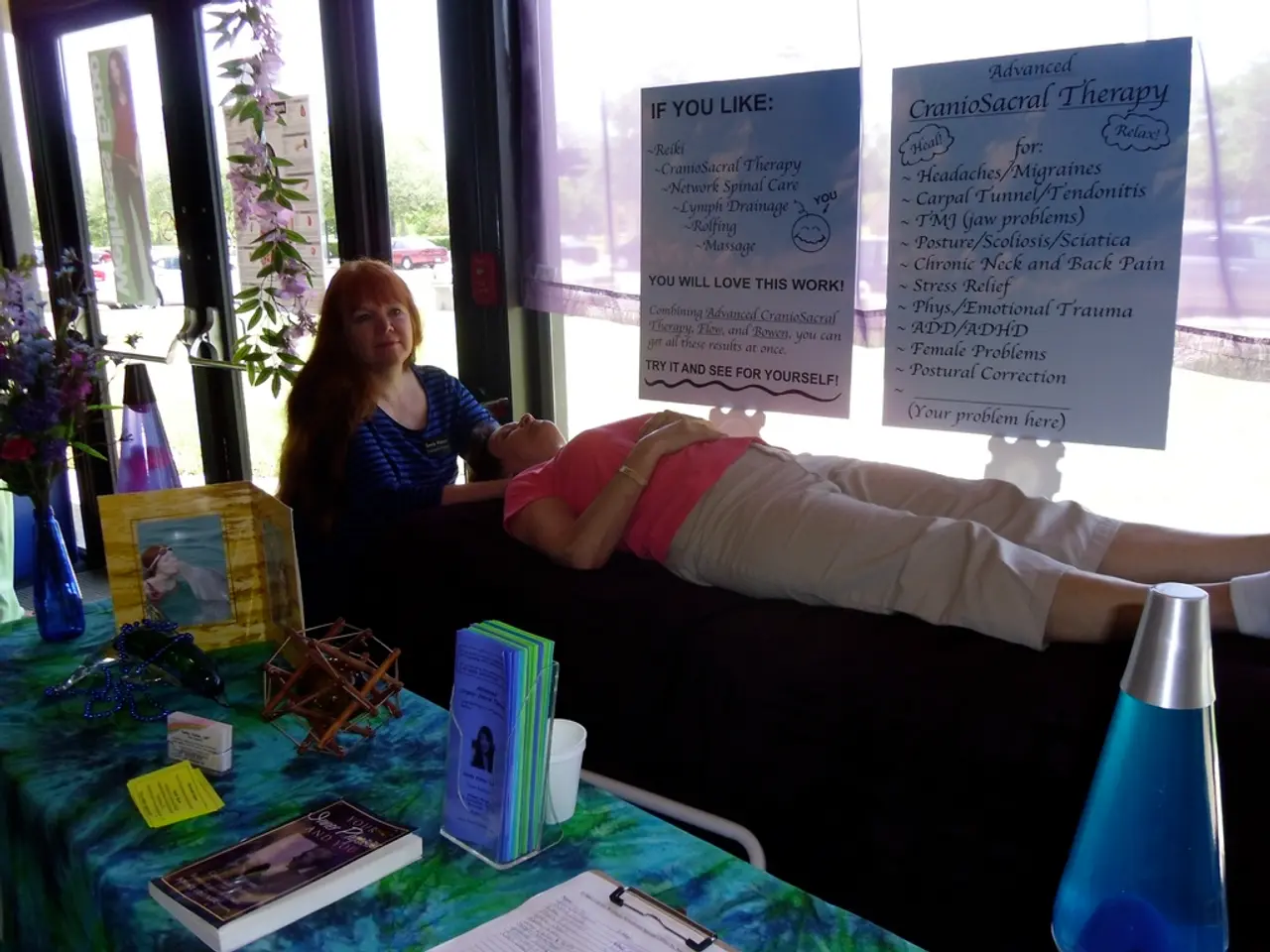Understanding Dry Scalp and Dandruff: Treatment Options and Prevention Strategies
Scale ailments: Root causes and remedial measures
When it comes to scalp care, two common issues that people often encounter are dry scalp and dandruff. While both conditions can cause discomfort and affect the health of your hair, they require different approaches for treatment.
Dry Scalp Treatment
For a dry scalp, the focus is on moisturizing and soothing the scalp. Common treatments include the use of various oils such as coconut oil, jojoba oil, tea tree oil, argan oil, peppermint oil, and aloe vera. These oils help relieve dryness and soothe irritation. Additionally, ingredients with anti-inflammatory, antibacterial, and antioxidant properties, like rosemary oil, witch hazel, and copper peptide complex, support scalp health by nourishing and calming the skin [1].
Dandruff Treatment
In contrast, dandruff treatments emphasize anti-fungal agents and medicated shampoos that reduce the yeast responsible for flaking and inflammation. Common anti-dandruff shampoo ingredients include climbazole, ketoconazole, selenium sulfide, zinc pyrithione, coal tar, and salicylic acid, which control Malassezia yeast growth and help shed scalp flakes [1][3]. Anti-dandruff shampoos often help reduce flakes and itching by targeting the root fungal cause rather than just moisturizing.
General Scalp Care Strategies
Beyond specific treatments, general strategies for scalp care include exfoliating the scalp to remove dead skin through gentle scrubs, regular shampooing (frequency varies by individual), and combining detox with moisturization to maintain scalp balance [3][4]. Home remedies like neem water rinses, yogurt and honey masks, and baking soda scrubs are used for both dry scalp and dandruff depending on symptoms, targeting either moisture or fungal/bacterial control [2].
Comparison of Treatments
| Aspect | Dry Scalp Treatment | Dandruff Treatment | |-------------------------|-----------------------------------------------------|--------------------------------------------------| | Goal | Moisturize and soothe dry, flaky scalp | Control fungal overgrowth causing flaking | | Key Ingredients | Oils (coconut, jojoba, tea tree), aloe vera, rosemary oil, witch hazel | Anti-fungals (climbazole, ketoconazole, selenium sulfide, zinc pyrithione), coal tar, salicylic acid | | Approach | Hydration, anti-inflammatory, antimicrobial support | Anti-fungal, exfoliation, medicated shampoo use | | Additional Methods | Scalp oil massage, gentle exfoliation | Anti-dandruff shampoos, scalp exfoliation, regular washing | | Home Remedies | Coconut oil, argan oil, peppermint oil, aloe vera | Neem rinse, baking soda scrub, yogurt-honey mask |
Although some ingredients like climbazole can help both dry scalp and dandruff due to their anti-fungal and soothing properties, the core difference lies in addressing moisture deficiency for dry scalp versus yeast control for dandruff [1][3].
Additional Information
- The American Skin Association notes that dry skin is not usually anything to worry about.
- Dandruff is a common skin condition that causes gray or white flakes of skin to appear on the scalp and in the hair, while a dry scalp tends to cause dry skin on other parts of the body as well.
- Treatment for a dry scalp depends on its cause, and healthy lifestyle choices such as drinking plenty of water, getting enough sleep, avoiding caffeine and alcohol, avoiding certain heat sources, not using harsh hair products and shampoos, and learning to manage stress can help.
- Medicated shampoos can be used to treat dandruff.
- Contact dermatitis is an allergic reaction to something that comes into contact with the skin and can cause itching and burning or blistering of the skin on the scalp.
- A dry scalp is a condition where the scalp has dry skin.
- Researchers are unsure of the exact cause of dandruff, but it may be the result of other skin conditions such as seborrheic dermatitis, tinea capitis, eczema, contact dermatitis, psoriasis, or cradle cap.
- If contact dermatitis is the cause, corticosteroids may be required.
- Underlying health conditions such as atopic dermatitis, contact dermatitis, and scalp psoriasis can also cause a dry scalp.
- Symptoms of dry scalp include patches of itchy or scaly skin, flaky skin with a rough texture, skin that stings or burns, peeling skin, and itchy skin.
- To prevent dry skin on the scalp, people can wash their hair in warm water, use gentle, fragrance-free hair cleaning products, avoid heat sources, avoid products that irritate the scalp, and drink plenty of water.
- People with atopic dermatitis are advised to avoid triggers such as stress, sweat, soaps and detergents, and hair care products.
- A dry scalp can be a symptom of an underlying skin condition, and anyone who suspects they have an underlying skin condition should talk to a doctor.
- Over-the-counter products can sometimes help treat scalp psoriasis, but in more severe cases, doctors might recommend phototherapy or biologic drugs.
- Atopic dermatitis is the most common form of eczema and can cause dry, itchy rashes in children and dry, easily irritated skin in adults.
- Scalp psoriasis affects around 50% of people with psoriasis and can cause patches of skin that are violet or purple on black skin or red on white skin, dandruff-like flaking, a dry scalp, and itching that can range from mild to intense.
- Dry skin can be caused by low humidity, indoor heating, not drinking enough water, using harsh cleaning products, taking long, hot showers or baths, living in cold, dry conditions, and using artificial heat sources.
- Doctors might recommend special shampoos or biologic medications for people with atopic dermatitis to help control the condition.
- People who are over 40 years of age, have brown, black, or fair skin, have jobs that involve their hands being in water a lot, live in cold climates, smoke, or have underlying health conditions are more at risk of dry skin.
- Skincare and haircare products that contain oils such as coconut, jojoba, tea tree, argan, peppermint, and aloe vera may help alleviate dry scalp by moisturizing and soothing the skin.
- Anti-fungal agents like climbazole, ketoconazole, selenium sulfide, zinc pyrithione, coal tar, and salicylic acid are often found in dandruff treatment products, as they control the Malassezia yeast responsible for causing flaking and inflammation.
- Scalp health can be further supported by ingredients with anti-inflammatory, antibacterial, and antioxidant properties, such as rosemary oil, witch hazel, and copper peptide complex, which nourish and calm the skin.
- Psoriasis, a commonly misunderstood skin condition, may contribute to dandruff or a dry scalp, and individuals should discuss any potential underlying skin conditions with a doctor.
- To maintain a balanced scalp and prevent dry skin, healthcare and wellness tips include regular shampooing, gentle exfoliation, and following a healthy lifestyle, which may include drinking plenty of water, managing stress levels, and avoiding harsh hair products and heat sources.




